

Identity Status - an overview. Development of Personal Identity in Adolescence Erik Erikson initiated a tradition in the study of the concept of personal identity.
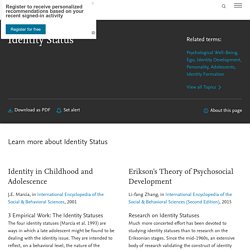
His interest in this topic was clearly stated in his early work on World War II veterans, men who “did not know any more who they were” and therefore provided evidence of a “distinct loss of ego identity.” As Erikson (1968: p. 67) observed clinically, “the sense of sameness and continuity and the belief in one's social role were gone.” This was the first time in his career that he formulated the assumption of the importance of a sense of identity for a healthy person. For Erikson, adolescence was only completed when the individual could subordinate his childhood identifications to the choices and decisions he had to transform into meaningful commitments, which also needed confirmation by a significant social community.
Marcia chose two dimensions, exploration (originally called crisis) and a commitment to empirically document the identity process. Identity Status Theory (Marcia) Based on Erik Erikson’s groundbreaking work on identity and psychosocial development in the 1960s, Canadian developmental psychologist James Marcia refined and extended Erikson’s model, primarily focusing on adolescent development[1][2]. Addressing Erikson’s notion of identity crisis, Marcia posited that the adolescent stage consists neither of identity resolution nor identity confusion, but rather the degree to which one has explored and committed to an identity in a variety of life domains from vocation, religion, relational choices, gender roles, and so on. Marcia’s theory of identity achievement argues that two distinct parts form an adolescent’s identity: crisis (i. e. a time when one’s values and choices are being reevaluated) and commitment. He defined a crisis as a time of upheaval where old values or choices are being reexamined.
Erikson's Psychological Stages (Summary Table) Why do teens forge a sense of identity? Scientific explanation to why teenagers feel a need to develop sense of identity. Learning Objectives Summarize the physical and cognitive changes that occur for boys and girls during adolescence.Explain how adolescents develop a sense of morality and of self-identity.
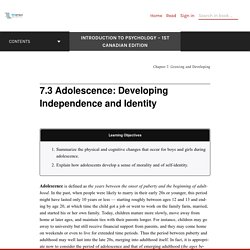
Adolescence is defined as the years between the onset of puberty and the beginning of adulthood. In the past, when people were likely to marry in their early 20s or younger, this period might have lasted only 10 years or less — starting roughly between ages 12 and 13 and ending by age 20, at which time the child got a job or went to work on the family farm, married, and started his or her own family. Today, children mature more slowly, move away from home at later ages, and maintain ties with their parents longer. For instance, children may go away to university but still receive financial support from parents, and they may come home on weekends or even to live for extended time periods. 5 Ways to Help Your Teen Develop a Sense of Purpose. How Can I Improve My Self-Esteem? (for Teens)
What Is Self-Esteem?
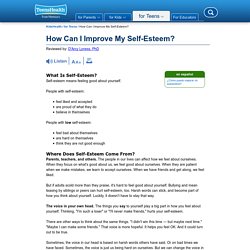
Self-esteem means feeling good about yourself. 7 Ways to Help Teens and Tweens Gain Self-Awareness. Self-awareness is an important quality for tweens and teens with learning and thinking differences to develop.
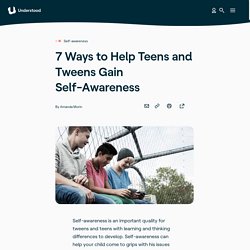
Self-awareness can help your child come to grips with his issues and understand how they affect him in school and elsewhere. Encourage your child to speak openly about his issues. Tweens and teens with learning and thinking differences can be quick to criticize themselves. 7 Ways to Help Build Your Teen's Self-Esteem. Today’s teenagers are confronted with a variety of tough issues, including their physical appearance, who they choose as friends, how they behave in public, how well they perform in sports and school, and much more.

As a parent, you want to help your child be as successful as possible, especially when it comes to their self-image and self-worth. Most importantly, perhaps, is that you want your child to grow into a confident and responsible adult, thriving in all areas of life. But that isn’t always easy. Many teens struggle to be accepted, both by the outside world and by themselves. Parents can play a very important role in helping to build their teen’s sense of self. Tip #1: Set Boundaries and Expect Them to Follow Rules Just like younger children, teenagers need boundaries. Tip #2: Be Generous With Praise Too often we focus on what our kids haven’t done or haven’t done right. When praising, include compliments for their efforts as well. Tip #3: Encourage Decision-Making and Opinions. Five Ways to Help Teens Feel Good about Themselves. No one wants to hang out with me.

I’m a failure at school. All my other friends seem happy. What’s wrong with me? These kinds of negative thoughts are becoming more common in our homes and schools. Teens are experiencing increased anxiety, and studies indicate that college students in Canada, the United Kingdom, and the United States are becoming more perfectionistic over time, measuring themselves against unrealistic standards. How to help your child develop a strong sense of self - North Shore Mama.
We all live such busy lives that there are many times we find ourselves doing things for our children that they are more than capable of doing for themselves.

If, for example, we consider the routine of getting our kids ready for school in the mornings…… we wake them up, we make them their breakfast, we pack their snack, we make their lunch, we pack their backpack, we remind them when they have to leave. We have to ask ourselves why we continue to do it all? Maybe it’s because it is easier, quicker and habit for us to just do it. When our children are younger, we have to do more for them but, as they grow up, we often still find ourselves doing things for them that they are really perfectly capable of doing for themselves.
In the long run, this does not serve or teach our children well. Your Child's Self-Esteem (for Parents) Five Ways to Help Teens Build a Sense of Self-Worth. No one wants to hang out with me.
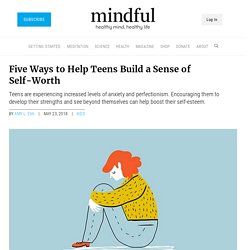
I’m a failure at school. All my other friends seem happy. What’s wrong with me? These kinds of negative thoughts are becoming more common in our homes and schools. Teens are experiencing increased anxiety, and studies indicate that college students in Canada, the United Kingdom, and the United States are becoming more perfectionistic over time, measuring themselves against unrealistic standards. Why is this happening? A 2018 study of early adolescents suggests that self-concept (your perception of self) plays a central role in emotional well-being. So, how can we influence how students think about themselves? 1. Although you may have heard this before, kids really can benefit from regular exercise (especially when their tendency is to sit in front of a screen).
Apparently, the exercise setting also matters. Adolescents’ self-concept is most strongly linked to their sense of physical attractiveness and body image, an area where many people struggle. 2. How Teenagers Find Themselves. Teens are notoriously self-conscious.

Now brain-imaging experiments are revealing how this adolescent predilection might be the result of changes in brain anatomy linked with the self, and the findings may hint at how the sense of self develops in the brain. One way we build a sense of self is by reflecting on how others perceive us, a concept psychologists have dubbed “the looking-glass self.” To see how teenagers reacted to what other people thought of them, researchers asked adolescent girls ages 10 to 18 to imagine a variety of scenarios involving onlookers that were designed to evoke social emotions such as guilt or embarrassment—for example, “You were quietly picking your nose, but your friend saw you.”
It makes evolutionary sense for teenagers to be highly concerned about what others think, Blakemore suggests. Adolescence requires becoming more independent because one’s parents might not be around much longer. 7 Tips to Help Your Teen Create a Strong Sense of Self. 7 Tips for Parent’s to Help Their Teen Create a Strong Sense of Self As we welcome in the New Year we also look at goals and new opportunities to explore in the coming year.
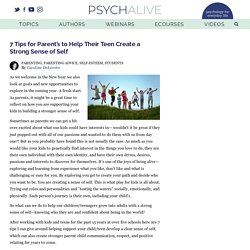
A fresh start.